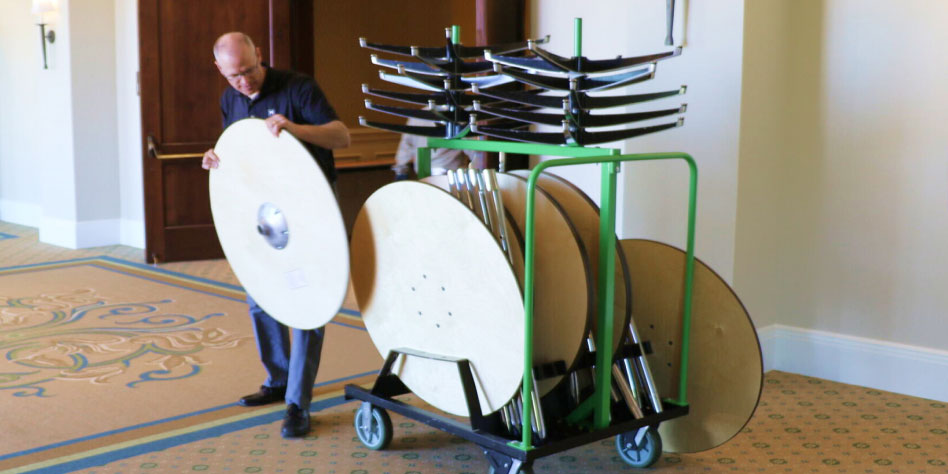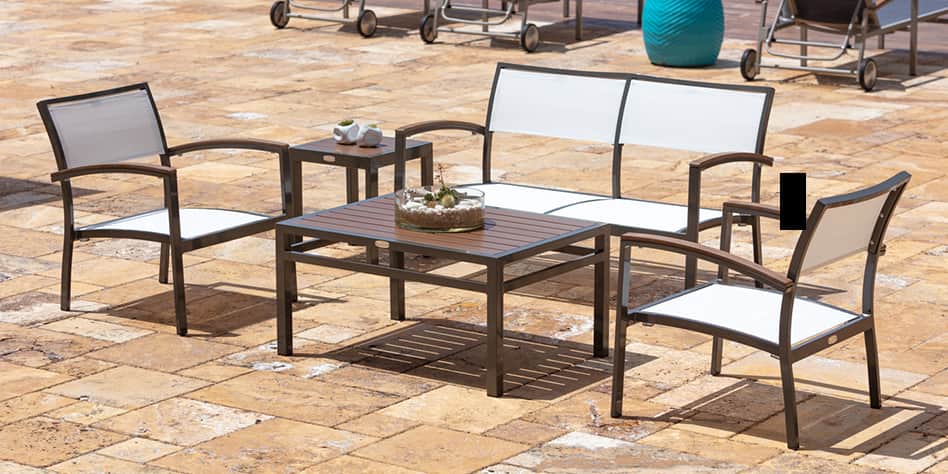
How much thought do you put into dining room seating for your restaurant? You might not think about it too much, but the right type of restaurant chair can do wonders. It makes a big difference.
So, yes, focus on the food. Ensure that every menu item is delectable, that each dessert melts in the mouth, and that every meal has the perfect drink pairing. Train your servers to be friendly and proficient, and don’t neglect your marketing until word of mouth does the job for you.
But, at some point, consider the chairs. Either now or sometime along the road, you’ll need to remodel to keep your place looking fresh and current. We’ve compiled this restaurant chair guide to help you make the best decision when it’s time.
Why Does the Type of Restaurant Chair Matter?
Chances are, you don’t want your customers to leave your dining experience focused on the seating. You want them to think about the excellent food, the professional service, and the great time they had.
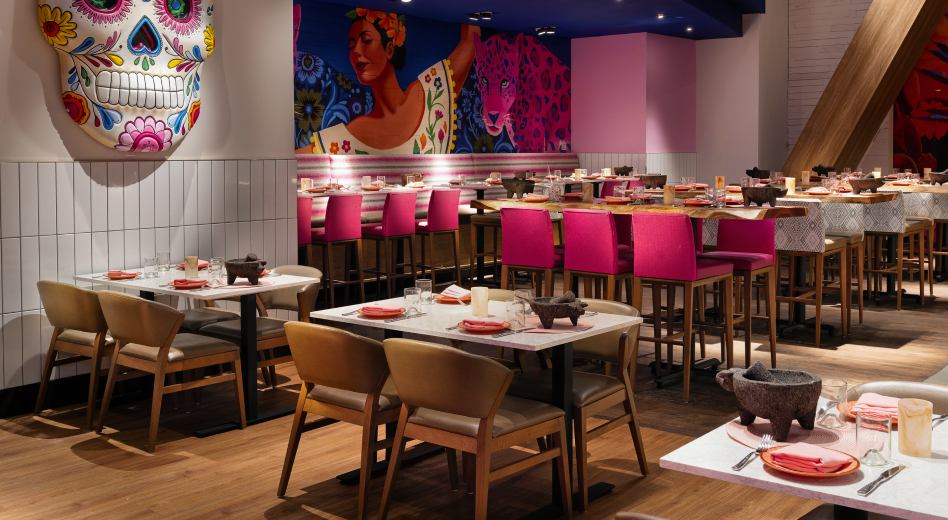
Great seats are unobtrusive and accommodating; chairs only draw attention to themselves if there’s a problem. There are many reasons to carefully select the type of restaurant chairs, including guest comfort, ambiance, durability, maintenance, and flexibility.
- Comfort: As mentioned previously, you don’t want your guests to think too much about the chair. It should be so comfortable that they don’t give it a second thought.
- Ambiance: Choose seating that fits your brand and the vibes that you want to foster.
- Durata: Wear and tear is to be expected in a popular restaurant. A robust clientele is great for revenue but puts more strain on the furniture. Take material longevity into account.
- Maintenance: The material determines how much work is needed when food and drink inevitably spill onto the chairs. Fabric upholstery is harder to maintain than finished wood or plastic that just needs a quick wipe-down.
- Flexibility: Will your dining room be setup the same way every day, or will you need to rearrange chairs and tables for special events? Stackable, lightweight chairs may make your life much easier if you plan to move them around a lot. They will also make daily cleaning much easier.
6 Restaurant Chair Types to Choose From
What type of chairs are used in a restaurant? There’s no single right answer. It depends on what works best for your business. Here are some of the most common options.
1. Wooden Chairs
Wood chairs have been used in restaurants for ages, and this isn’t likely to change anytime soon. Wooden chairs can fit a wide variety of styles, including upscale, rustic, sophisticated, or vintage. There’s little to limit the look and feel of a wooden chair. As long as they’re made from high-quality wood, wood chairs can be extremely durable and last for years. Finish and upholstery options provide even more customization. You can find stackable options if that would be useful for your restaurant.
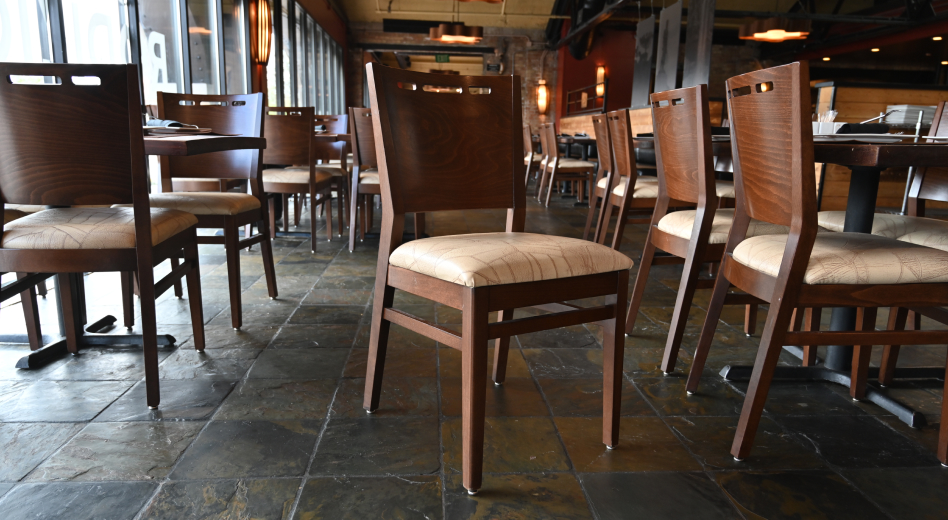
Depending on the type of wood used, wooden chairs can be heavy. This can reduce their flexibility and result in more wear on your floors. Make sure floor glide protectors (found on the bottom of the chair legs) are in good working order to protect floors. Wooden chairs retain warmth and can feel more cozy in the winter than metal chairs, but they can be damaged by standing water or high humidity.
2. Metal Chairs
For a more modern look, metal chairs may be a good option. Multiple types of metal, including aluminum and steel, can be used for chair frames. Metal is durable and easy to clean. If you’re going for a hip, industrial vibe, these chairs can help you create that aesthetic. Some metal chairs have powder coated or faux wood finishes, allowing metal framed chairs to create traditional and upscale looks.
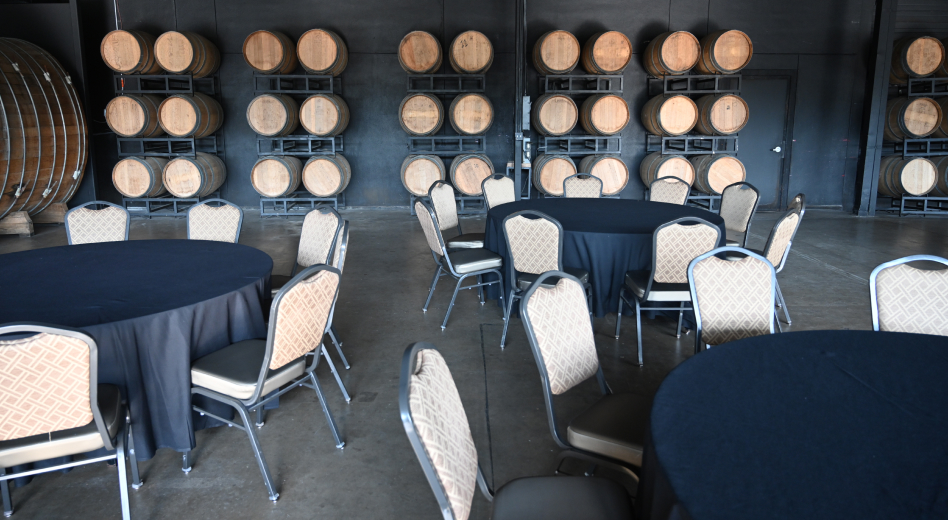
But take care to make sure your metal chairs are comfortable. Without some sort of cushioning or upholstery, they might not feel great throughout the entire meal, and some guests might consider them a cold, uninviting choice.
If you like the look of wood but you live in a humid climate and want a more durable option, consider a faux wood aluminum chair.
3. Upholstered Chairs
Upholstered chairs can be fully upholstered or feature upholstered seats or backrests. Exposed chair frames can be made of wood, metal, or plastic. Custom upholstered chairs come in nearly any material, which allows you to customize them to an incredible degree.
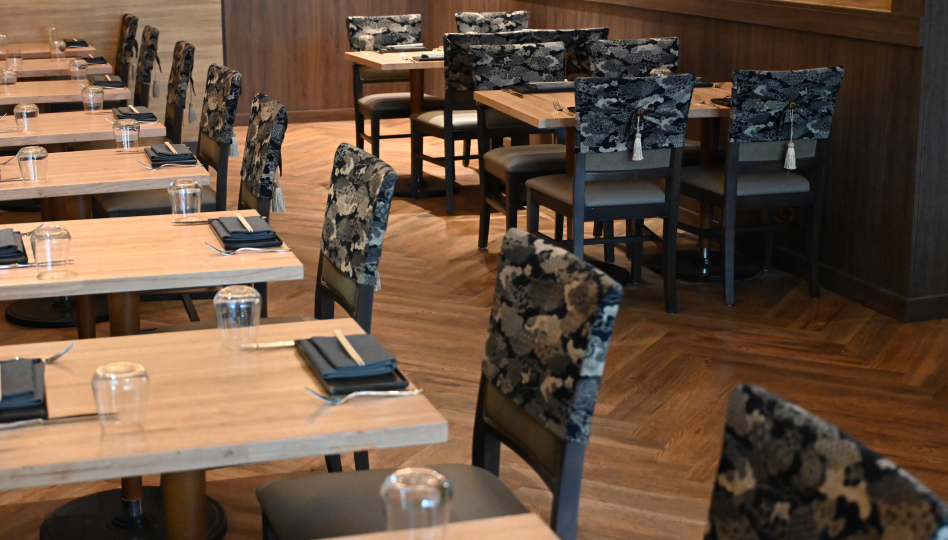
Select the chair style first and then the best chair material with the characteristics you need—durable, easy to clean, water-resistant, etc. The right upholstery can make a chair more comfortable and inviting. Plus, upholstery can be replaced periodically for a whole new look at a fraction of the cost of new furniture.
4. Plastic Chairs
You might not be quick to think of plastic chairs for a fine dining experience, but they are excellent for cafés and fast food restaurants. Plastic chairs have some strong benefits since they tend to be inexpensive, they’re completely water resistant, and they’re easy to replace. Plastic restaurant chairs are usually lightweight, and many varieties stackable. Plastic holds up well in the elements, making these chairs a good choice outdoors as well as indoors.

However, take care when choosing a plastic chair. Plastic chairs can look cheap to your guests and may be more uncomfortable than other materials. They aren’t as long-lasting as metal or wooden chairs.
5. Patio Chairs
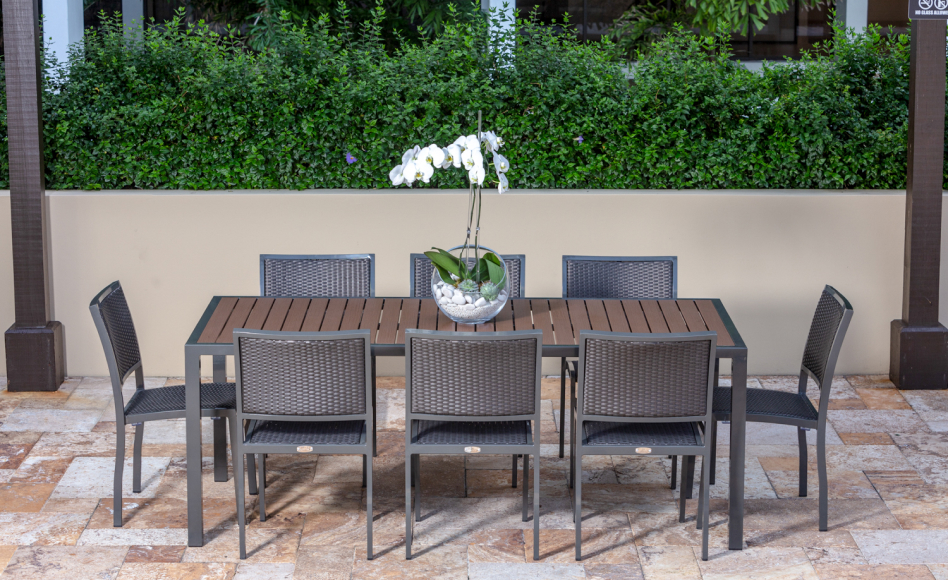
If you have outdoor dining, you must choose a patio chair built for all weather use. Patio chairs are often made with powder coated (rust proof) metal frames and seats and backrests made of faux wood, all-weather wicker, or fabric. Some have cushions. The materials may vary, but the key is that patio chairs are designed for year-round use, so they need to be resistant to damage from moisture, UV rays, heat, cold, and pest damage. Outdoor chairs will have different care instructions, especially if cushions are included for comfort. Patio chairs are durable but not indestructible—harsh weather will have an eroding effect over time.
6. Benches
Casual-style restaurants and pubs may consider benches. You can maximize seating capacity with this option. Benches can be made with or without backrests. Some benches have seat cushions, while others have solid wood or metal seats.
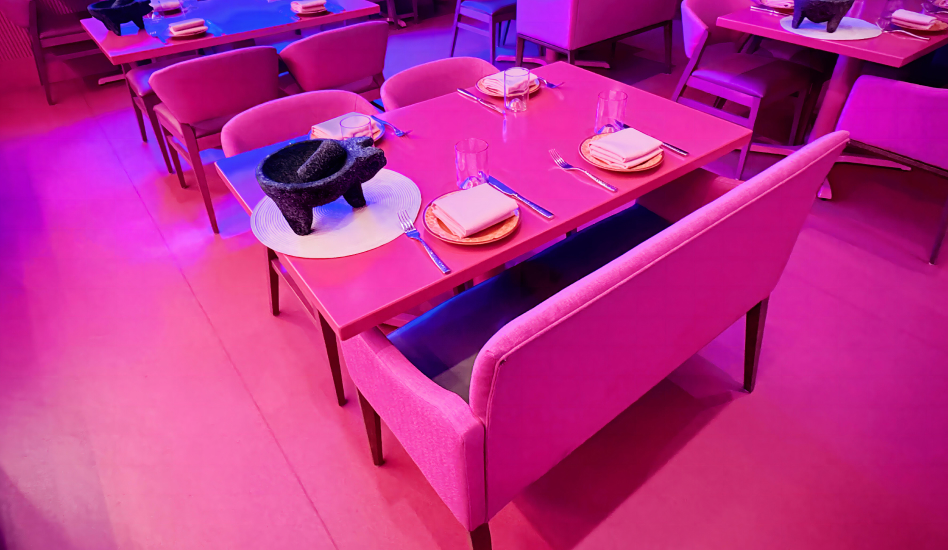
Bench restaurant seating encourages a communal dining experience—although this same element that could appeal to certain guests could make some feel uncomfortable, so you should have a strong grasp on your target demographic before committing to benches.
Benches might not be the best option for guests with mobility issues. Also, unpadded benches or benches without backrests aren’t comfortable for extended periods of time, so it’s a better idea to choose bench seating for fast food restaurants rather than fine dining. Finally, bear in mind that you’ll be limited on your dining room layout options if you choose benches. They don’t provide the flexibility of traditional chairs.
What Is the Best Seating Arrangement?
There are several ways you can lay out the seating in your restaurant. When planning out the layout, make sure there is adequate space between tables and guests. Fast casual restaurants often seat guests more closely together, while fine dining generally offers more space between tables, which contributes to the opulent feel. Make sure that there is adequate space for wheelchairs to navigate to each table, and that ADA requirements are met (which includes having 36″/91.4 cm wide aisles).
The best layout for your dining area depends on your restaurant and the ambiance you’re looking to conjure. Here are some popular options.
- Free-Standing: Free-standing seating offers the greatest amount of freedom and flexibility. Tables of varying sizes are artistically arranged throughout the dining room, allowing appropriate space between tables while also maximizing the guest capacity. Rounds, squares, and rectangles can be used together, as long as they have a unifying tabletop style or matching tablecloths. Most of the tables are two- and four-top tables, with a few larger tables. With this restaurant layout, tables can be moved for special events or to accommodate large groups.
- Anchored Booths: This arrangement has booths along the walls and against room dividers. Booths are often paired with standalone tables in the middle of the room, which allows some flexibility when large tables need to be made for big groups. Many guests like booths because they create the feeling of a private dining area, while restauranteurs like them because they’re space efficient. It’s a popular seating arrangement for fine dining, family restaurants, and casual dining.
- Communal: Featuring large tables, communal seating is designed to seat multiple parties at the same table. It encourages a social atmosphere and is best for cafes, diners, and fast-casual dining scenarios.
- High-Top: These taller tables are often paired with bar stools, although you can also find matching high-backed chairs. They are best for bars or coffee shops.
- Indoor/Outdoor Dining: Outdoor chairs and tables allow restaurants to expand seating during busy times. With this layout, guest seating is expanded onto a patio or garden area in good weather. Umbrellas can offer shade. Clear walkways must be maintained in the dining areas to allow guests to move freely between indoor and outdoor areas
- Banquette: Often used in fine dining, a banquet-style layout uses only tables of uniform style and size, such as all four-top tables, with graciously appointed chairs. Tables can be placed together to accommodate large groups. This dining room style is often combined with dim lighting and bespoke music to create a cultured and upscale feeling.
Any of these styles can be combined or modified for the setup that works best with your restaurant. As long as it works for you and your guests, you have a winning layout.
Choose MityLite for Your Restaurant Furnishing Needs
When you want comfortable, professional seating for your restaurant, it’s time to turn to MityLite. Our customizable chairs and tables come in a wide selection of styles to fit any aesthetic. Reach out to us today to tell us about what you envision for your restaurant.

